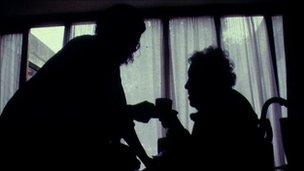Regulator raises elderly care concerns
- Published

The Care Quality Commission carried out 100 unannounced inspections
Serious concerns have been raised by the NHS care regulator about the way some hospitals in England look after elderly patients.
The Care Quality Commission said three had failed to meet legal standards for giving patients enough food and drink and treating them in a dignified way.
They were Alexandra Hospital, Redditch, the Royal Free, in London, and Ipswich.
The CQC, which carried out unannounced inspections, also raised concerns about three other NHS hospitals.
The commission has published the first 12 results of 100 such inspections, called for by the health secretary Andrew Lansley after a long campaign by the Patients Association, which highlighted poor care for the elderly.
While its inspectors said there had been many examples of people being treated with respect and given excellent care, in other cases people had not been helped to eat and drink, "with their care needs not assessed and their dignity not respected".
All six hospitals about which concerns were raised must now say how and when they will improve.
The worst three offenders will have to improve or face action from the regulator.
Prescribing water
The inspections looked at nutrition and found cases of patients not being helped to eat, poor monitoring of patients' weight and people not being given enough to drink, with water being out of reach for long periods of time.
In one case, a member of staff at Worcestershire Acute Hospitals NHS Trust said they had to prescribe water on medical charts to ensure patients got enough to drink.
Inspectors also looked at dignity and respect, noting that elderly patients were sometimes not involved in their own care and were given no explanation of the treatment they were to receive or asked for consent.
Staff also treated people in a disrespectful way, spooning food into their mouths without engaging them.
One man told inspectors that staff "talk to me as if I'm daft".
Chief Executive John Rostill, Worcestershire Acute Hospitals: "This is a real wake up call"
The reports acknowledge examples of excellent care where treatment was explained in a way patients could understand and they were treated with respect and dignity.
Jo Williams, chair of the CQC, said the inspections had built a detailed picture of the care being received by elderly patients in NHS hospitals in England.
"Many of these reports describe people being 'cared for' in the truest sense. Sadly, however, some detail omissions which add up to a failure to meet basic needs - people not spoken to with respect, not treated with dignity, and not receiving the help they need to eat or drink.
"These are not difficult things to get right - and the fact that staff are still failing to do so is a real concern. These are the basics that help ensure every patient is treated like an individual - not a nuisance to be ignored or a task that must be completed.
"This is what we expect for ourselves and for our own families, and what every patient should expect from the people who care for them."
Enforcement powers
Health Secretary Andrew Lansley said that everyone admitted to hospital deserved to be treated as an individual, with compassion and dignity.
"The inspection teams have seen some exemplary care, but some hospitals are not even getting the basics right. That is unacceptable.
"Where the inspections uncovered appalling levels of care, the CQC will be able to use its enforcement powers to ensure that real improvements are made."
One of the hospitals found to have problems was the Royal Free Hampstead NHS Trust.
In a statement the hospital said it was disappointed by the CQC report, but that it took the findings very seriously.
"Following the CQC's concerns, we immediately implemented an action plan to make sure we comply with both the letter and the spirit of the standards," it said.
"As part of the action plan, we are rolling out a programme of 'nurse rounding' which ensures that every patient is reviewed by a nurse at least once an hour to ensure their comfort and needs are met.
"We will continue to ensure that all measures are taken to respect patients' privacy, dignity and confidentiality and patients are put at the centre of communication about their care."
Siobhan Jordan, director of nursing at the Ipswich Hospital NHS Trust, said: "The trust was disappointed by, but responsive to, the findings of the review team. Much work is under way within the trust, particularly focusing on meeting the needs of the older person.
"The trust recognises the value of the regulator's unannounced visit and continues to focus on improving care at the hospital."
Worcestershire Acute Hospitals NHS Trust said it was "extremely disappointed" by the findings and had already shown "significant improvements".
Apology
Director of nursing and midwifery Helen Blanchard said: "I'd like to apologise to the patients and their families that were affected by the care that this report refers to.
"What the inspectors observed on that day was not acceptable and it has been something we have taken very seriously indeed."
She said the findings were an unpleasant surprise because service on the wards concerned had been traditionally "very good".
The trust would continue to carry out its own unannounced ward visits to monitor standards, she added.
More CQC reports will be published over the summer with the findings of the programme of inspections released in the autumn.
- Published26 May 2011
- Published18 May 2011
- Published15 February 2011